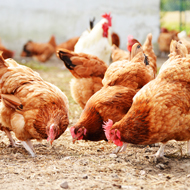Top animal welfare scientists to receive medals

The UFAW medal recognises the exceptional achievements of scientists who have made fundamental contributions to animal welfare over a number of years.
Two highly respected scientists will be awarded medals for outstanding contributions to animal welfare science later this month.
The awards, presented to Professor Donald Broom and Professor Christopher Wathes, will be presented in York by the Universities Federation for Animal Welfare (UFAW).
Prof Wathes's medal will be accepted by his wife, Claire, as he sadly passed away in May. Described as a scientist of the highest calibre, he engaged with industry throughout his career to ensure his research could be applied to practical solutions such as improvements to animal transporters, methods of stunning and the design of cages and housing for laying hens and broiler chickens.
He also had an early and continued role in the development of precision livestock farming, believing that the use of real-time monitoring can be used for early detection of health and welfare problems.
A major contribution came through his eight years as chairman of the Farm Animal Welfare Council (FAWC), during which time he brought together people of different backgrounds and viewpoints, getting them to work together on sustainable solutions to improve animal welfare. He developed the concepts of the 'Good Life' and 'Life Worth Living', which took the Five Freedoms to the next level.
In addition to this, Prof Wathes helped to train many students and young scientists - many of whom went on to develop a career promoting animal welfare - and sought to engage with school children about where their food comes from and the welfare implications of this.
Professor Donald Broom will also receive the UFAW medal, which recognises the exceptional achievements of scientists who have made fundamental contributions to animal welfare over a number of years. In the 1980s, Prof Broom became the world's first professor of animal welfare and since then has had a sustained influence on thinking in the UK, Europe and elsewhere.
Having published well over 350 peer-reviewed publications, books and textbooks, it is difficult to read learned treatises on animal welfare science without coming across Prof Broom's thinking. Not only did he help to create the frontiers of animal welfare science, he also applied it to the practical care and protection of farm, companion, working and wild animals.
Prof Broom has had a profound influence on the science-based developments of UK and international animal welfare laws, regulations, directives and advisory documents. Throughout his career he has also shown unfailing encouragement of other scientists and continues to lecture overseas and support young scientists.
The medals will be presented on 23 June at UFAW's conference, Recent Advances in Animal Welfare Science V.



 HMRC has invited feedback to its communications regarding the employment status of locum vets and vet nurses.
HMRC has invited feedback to its communications regarding the employment status of locum vets and vet nurses.